DEA 2020 Year in Review: Combatting Serious Drug-Related Threats During the Pandemic
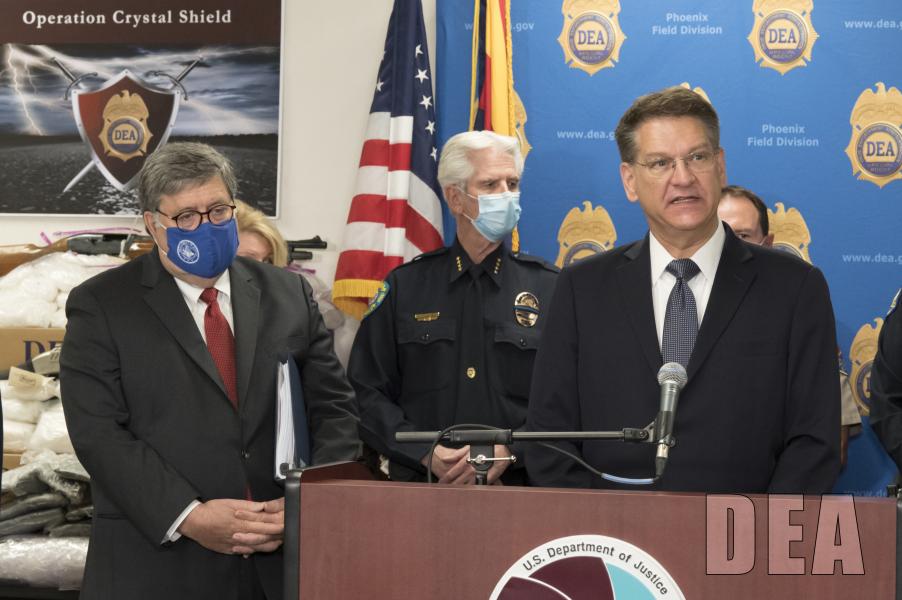
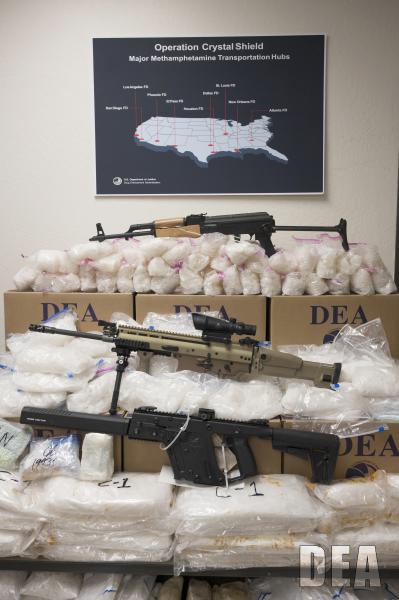

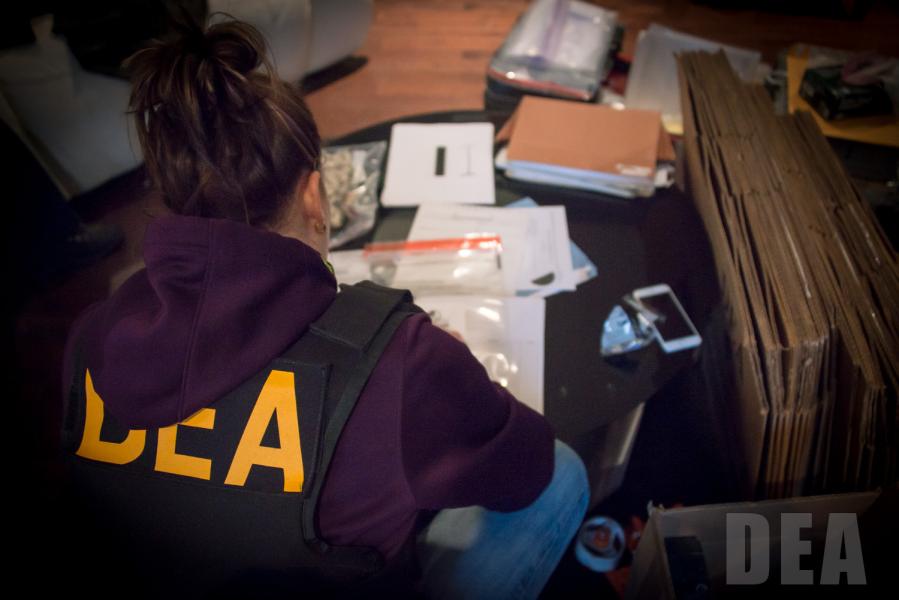
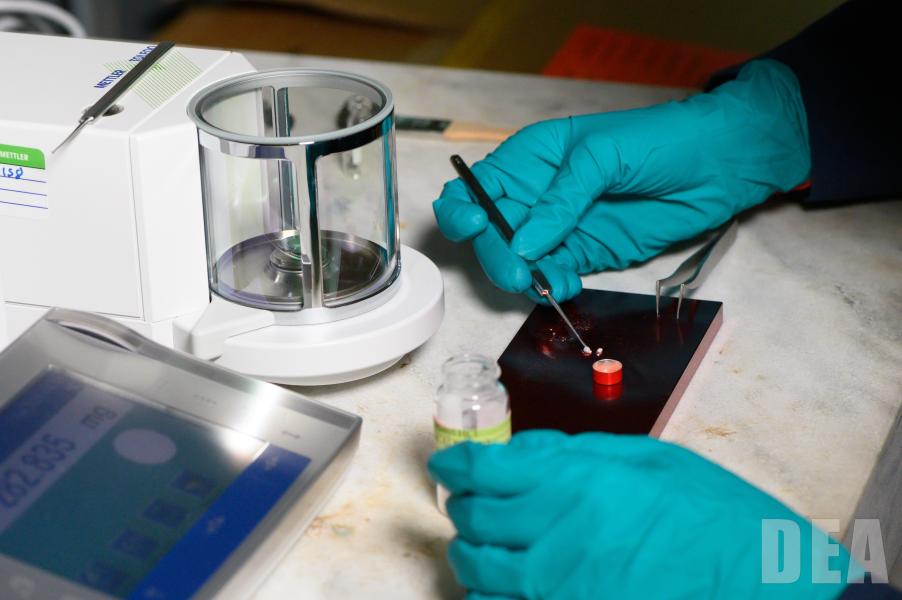
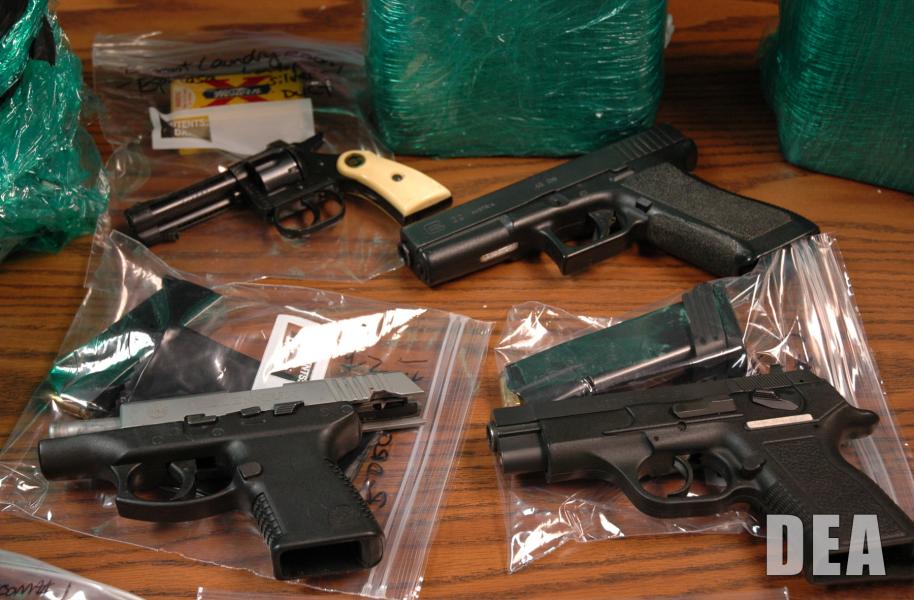
WASHINGTON – With the unprecedented worldwide health emergency brought on by COVID-19, last year was filled with new challenges and increased risks. While much of the world focused on combating the pandemic, DEA continued to implement initiatives to combat violent drug traffickers who were intent on flooding cities and rural areas alike with illicit, deadly drugs.
“In 2020, almost every aspect of our lives was affected by the COVID-19 pandemic,” said Acting Administrator Timothy J. Shea. “Despite this unparalleled disruption, DEA continually worked to identify and address threats to our communities, implementing significant operations to protect neighborhoods from the rise in violence, the scourge of methamphetamine, and the ongoing threat of opioids and fentanyl. DEA has also been on the front lines ensuring patients have access to lifesaving medications, and those suffering from substance use disorder have access to treatment. The people we serve are the reason we serve, and the successes of this past year demonstrate that commitment.”
According to recent data released by the Centers for Disease Control and Prevention, more than 81,000 people in the United States died of a drug overdose between May 2019 and May 2020. The number of overdose deaths accelerated significantly during the pandemic, resulting in the largest monthly increases documented since provisional data calculations began in 2015. DEA is working tirelessly to address this threat head on.
While synthetic opioids, such as illicit fentanyl, continue to be the primary cause of these deaths, there has also been an alarming increase in the number of deaths involving illicit stimulants, particularly methamphetamine. Overdose deaths connected to meth increased almost 35 percent in 2020, exceeding the number of cocaine-related deaths.
Simultaneously, violent crime rates showed a disturbing increase, with murder, aggravated assault, and other violent crimes on the rise. Drug trafficking is a known contributor to violent crimes in America.
In response to these concerning trends, DEA implemented a number of initiatives in 2020 to combat the methamphetamine threat, violent crime associated with drug trafficking, the opioid epidemic, and to maintain an appropriate supply of controlled substances for legitimate prescriptions, including for patients being treated for COVID-19.
Operation Crystal Shield
In February 2020, DEA launched Operation Crystal Shield, a major coordinated enforcement effort targeting methamphetamine transportation hubs throughout the United States to prevent these deadly narcotics from reaching our communities. In October 2020, DEA’s Los Angeles Field Division seized more than 2,200 pounds of meth in the single largest DEA domestic methamphetamine seizure in the last five years. Within days, DEA played a major role in another significant meth seizure in San Diego totaling more than 3,000 pounds. These two seizures – together equaling a staggering 2.6 tons – could provide a single dose of meth to every man, woman, and child in the United States and Mexico. In total, Operation Crystal Shield generated more than 800 investigations resulting in over 2,100 arrests, the seizure of nearly $54.5 million in drug proceeds, more than 300 firearms, and more than 60,000 pounds of methamphetamine.
Project Safeguard
More than 30,000 gangs operate on the streets of America with nearly all involved not only in distributing drugs, but also in committing violent crimes. In August 2020, DEA began Project Safeguard, an initiative specifically designed to combat violent crime associated with drug trafficking. DEA operations targeted dozens of violent street gangs and drug trafficking organizations, leading to the arrests of extremely violent, armed, and dangerous fugitives in major metropolitan areas, including Atlanta, Los Angeles, and Boston. DEA seized huge stashes of illicit drugs and over 30,000 rounds of ammunition, pipe bombs, and other explosives. Project Safeguard resulted in more than 750 investigations with nearly 2,230 arrests – including more than 40 dangerous fugitives. Cases under this initiative accounted for the seizure of nearly $33 million in assets, approximately 3,140 firearms, almost 200 kilograms of fentanyl, more than 240 kilograms of heroin, and more than 1,500 kilograms of methamphetamine.
In a short time, Project Safeguard demonstrated remarkable success disrupting the criminal activities of violent drug trafficking organizations by removing key members responsible for wreaking havoc and impacting the safety of communities. With illicit financial gains seized, DEA hindered or halted criminal organizations ability to rebound.
Operation LeGend
DEA played a significant role in the Department of Justice initiative Operation LeGend, a sustained, systematic, and coordinated law enforcement initiative in which federal law enforcement agencies worked in conjunction with state and local law enforcement officials to fight the surge in violent crime. DEA’s enforcement efforts under this operation have focused on targeting violent drug trafficking organizations, gangs, and individual drug traffickers in designated high-crime areas.
Since Operation LeGend began in July 2020, DEA has made 650 arrests and seized $9.24 million in assets, 595 firearms, 17 kilograms of fentanyl, 18 kilograms of heroin, 217 kilograms of methamphetamine, and 84 kilograms of cocaine from the nine Operation LeGend metropolitan areas.
Opioid epidemic
The opioid epidemic continues to be a serious threat to our communities, with synthetic opioid deaths up more than 38 percent as of May 2020 as compared to the previous year. A driving factor for this startling increase is the distribution of clandestinely manufactured fentanyl and its related compounds. Not only is fentanyl much more potent than heroin, in many parts of the United States it is much cheaper on the street. In early 2018, DEA emergency scheduled all fentanyl-related substances into Schedule I to address the imminent hazard to public safety, making it illegal to manufacture, import, distribute, or possess a fentanyl-related substance without appropriate DEA registration and approval. As a result of this action, the amount of fentanyl and fentanyl analogues seized originating from China has plummeted. In 2020, DEA worked with Congress to extend this emergency scheduling action through May 2021 to ensure this progress continues and to allow time to secure permanent scheduling legislation.
DEA announced in August a new e-commerce outreach program aimed at reducing the availability of equipment used to manufacture counterfeit prescription drugs, which are often laced with fentanyl. This DEA-led initiative focuses on educating online retailers about the sale of pill presses and components, and the associated regulations and restrictions involved in the sale and possession of these items.
Another effort to address the epidemic is the Department of Justice’s National Healthcare Fraud and Opioid Take-Down Initiative. DEA’s involvement in this effort, announced in September, resulted in 57 arrests, 19 administrative actions, over $1 million in civil fines, and almost $2 million in civil forfeiture. In addition, DEA’s work on the Appalachian Regional Prescription Opioid Strike Force directly led to the arrest of 73 healthcare professionals and other individuals in six states responsible for the unlawful distribution of 40 million medically unnecessary pain pills. Criminal and administrative actions like these send a clear message affirming DEA’s ongoing commitment to addressing the opioid epidemic while ensuring the safety of patients and the integrity of health care benefit programs.
Ensuring an adequate and uninterrupted supply of controlled substances
On the regulatory side, DEA took significant steps to ensure an adequate and uninterrupted supply of controlled substances and aggregate supplies during the COVID-19 pandemic. At the onset of the public health emergency declaration, a team of policy and regulatory experts assembled to quickly review and address requests to grant temporary exceptions to regulations in order to ensure the stability of the drug supply chain and continuity of care for patients who need access to controlled substances. Appropriate adjustments to the Aggregate Production Quota (APQ) for substances vital for COVID-19 patient care were timed to allow both an adequate supply and reduce the risk of diversion. Additionally, DEA supported temporary exemptions to telemedicine regulations, increased efforts to safeguard the continuity of treatment for those suffering from opioid use disorder, and expanded access to medication assisted treatment. With the support of our public health partners, DEA issued 81 temporary registrations as states sought to identify interim facilities to treat COVID-19 patients in the areas hardest hit by the pandemic. DEA worked closely with its federal partners in the Department of Health and Human Services to ensure that these actions would be helpful to the public health authorities who are on the front lines battling the pandemic. The agency continues to monitor and adjust the APQ, which has contributed to decreasing prescription opioid overdose deaths, to ensure Americans continue to have access to these essential medications and controlled substances, while mitigating the potential for diversion.
As we begin 2021, DEA remains dedicated to protecting our communities from the scourge of illicit drugs and helping those affected by the violence of drug trafficking, drug addiction, and illness. DEA is committed to continuing our efforts to disrupt and dismantle violent drug trafficking organizations and implementing initiatives to support safe, healthy communities.
# # #


